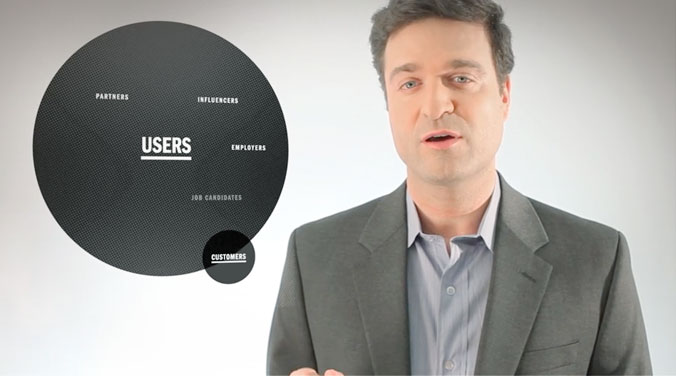The nearly 15-year-old branding agency HUGE is playing enough of a role in spinning out new ideas to the Brooklyn tech scene, that it can eat its own dog food.
Take last week’s event launching the paperback of CEO Aaron Shapiro’s book Users Not Customers at the company’s Dumbo headquarters. The event was organized by Togather, a new company enabling normal people to crowdsource events for writers. Togather spun out of HUGE Labs, the company’s internal incubator, which also spun out the social Intranet startup, Honey, with likely plans of others.
It’s good insight into Shapiro’s book.
As he discussed, he lays out a way forward for companies to build communities around their products that will ultimately drive sales, but is not strictly about sales. The book directs entrepreneurs in shifting, as the title implies, to thinking about the users your company has, not just its customers.
He began by emphasizing that every visitor to your website is important, not just as potential customer, but also as a potential evangelist or source for useful feedback.
The book is organized around a seven point model [PDF].
- User Centered Management. Shapiro said, “Every single interaction that a person wants to have with your company should be possible through digital. No humans required.”
- Concentric Organization. He went on to say that employees are also users, and that companies often want employees to evangelize more, but give them websites with difficult backends. Companies should prioritize simplifying it, by “making enterprise software as friendly as Tumblr, which allows employees to communicate more effectively with the outside world.”
- Disposable technology. Rather than investing huge amounts of money and bringing in loads of consultants every time a brand wants to update its site, digital should be constantly iterating, nimbly, with lots of experimentation. Companies shouldn’t get so invested in one giant overhaul that they aren’t ready to throw it out as better ideas come along.
- Higher calling products. Combine analog with digital that meets users needs. For example, Nike sells sneakers, but they sell them to improve your athletic performance. That’s why it is now also offering the Fuel band and its online community.
- Utility Marketing. Shapiro is demonstrating this with the posts we’ve been linking here. If you watch the videos linked in each of these points, you’ll get a lot of what’s useful about Shapiro’s book and, presumably, his company.
- Trust, Convenience, Price & Fun. Those are the four reasons that users tend to buy from companies. Not usually all four, but one of them tends to be a leading indicator for user selection.
- Bi-lateral customer service. Your website should make it possible for a digital native to self-serve almost all their problems online, no human contact needed. But if they are totally confused, it should also make it possible to get ahold of someone right away. He pointed to Apple and Zappos as two companies that have nailed this.
Shapiro had a lot of compelling tidbits to offer during the Q&A as well. Such as:
- “Mobile has gotten pretty mature. People aren’t updating their smartphones nearly as much as they used to. … it’s going to be interesting to see where the next wave of computing goes.” He pointed to Google Glass as a possible but not definite sign.
- Apps, he suspects, will decline in importance versus the mobile web, over the long term. “The primary reason for apps was to get around the bandwidth constraints of mobile broadband.”
- He fears for companies that have ad heavy sites given mobile constraints, and he pointed out that most of those big sponsors are probably tired of relying on banner ads, too.








